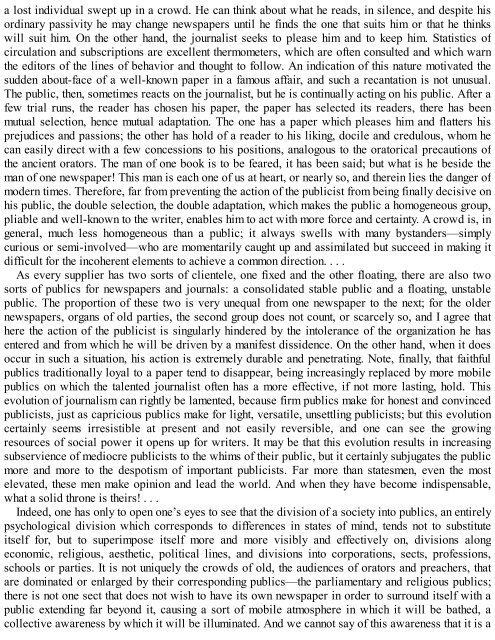3658925934
You also want an ePaper? Increase the reach of your titles
YUMPU automatically turns print PDFs into web optimized ePapers that Google loves.
a lost individual swept up in a crowd. He can think about what he reads, in silence, and despite his<br />
ordinary passivity he may change newspapers until he finds the one that suits him or that he thinks<br />
will suit him. On the other hand, the journalist seeks to please him and to keep him. Statistics of<br />
circulation and subscriptions are excellent thermometers, which are often consulted and which warn<br />
the editors of the lines of behavior and thought to follow. An indication of this nature motivated the<br />
sudden about-face of a well-known paper in a famous affair, and such a recantation is not unusual.<br />
The public, then, sometimes reacts on the journalist, but he is continually acting on his public. After a<br />
few trial runs, the reader has chosen his paper, the paper has selected its readers, there has been<br />
mutual selection, hence mutual adaptation. The one has a paper which pleases him and flatters his<br />
prejudices and passions; the other has hold of a reader to his liking, docile and credulous, whom he<br />
can easily direct with a few concessions to his positions, analogous to the oratorical precautions of<br />
the ancient orators. The man of one book is to be feared, it has been said; but what is he beside the<br />
man of one newspaper! This man is each one of us at heart, or nearly so, and therein lies the danger of<br />
modern times. Therefore, far from preventing the action of the publicist from being finally decisive on<br />
his public, the double selection, the double adaptation, which makes the public a homogeneous group,<br />
pliable and well-known to the writer, enables him to act with more force and certainty. A crowd is, in<br />
general, much less homogeneous than a public; it always swells with many bystanders—simply<br />
curious or semi-involved—who are momentarily caught up and assimilated but succeed in making it<br />
difficult for the incoherent elements to achieve a common direction. . . .<br />
As every supplier has two sorts of clientele, one fixed and the other floating, there are also two<br />
sorts of publics for newspapers and journals: a consolidated stable public and a floating, unstable<br />
public. The proportion of these two is very unequal from one newspaper to the next; for the older<br />
newspapers, organs of old parties, the second group does not count, or scarcely so, and I agree that<br />
here the action of the publicist is singularly hindered by the intolerance of the organization he has<br />
entered and from which he will be driven by a manifest dissidence. On the other hand, when it does<br />
occur in such a situation, his action is extremely durable and penetrating. Note, finally, that faithful<br />
publics traditionally loyal to a paper tend to disappear, being increasingly replaced by more mobile<br />
publics on which the talented journalist often has a more effective, if not more lasting, hold. This<br />
evolution of journalism can rightly be lamented, because firm publics make for honest and convinced<br />
publicists, just as capricious publics make for light, versatile, unsettling publicists; but this evolution<br />
certainly seems irresistible at present and not easily reversible, and one can see the growing<br />
resources of social power it opens up for writers. It may be that this evolution results in increasing<br />
subservience of mediocre publicists to the whims of their public, but it certainly subjugates the public<br />
more and more to the despotism of important publicists. Far more than statesmen, even the most<br />
elevated, these men make opinion and lead the world. And when they have become indispensable,<br />
what a solid throne is theirs! . . .<br />
Indeed, one has only to open one’s eyes to see that the division of a society into publics, an entirely<br />
psychological division which corresponds to differences in states of mind, tends not to substitute<br />
itself for, but to superimpose itself more and more visibly and effectively on, divisions along<br />
economic, religious, aesthetic, political lines, and divisions into corporations, sects, professions,<br />
schools or parties. It is not uniquely the crowds of old, the audiences of orators and preachers, that<br />
are dominated or enlarged by their corresponding publics—the parliamentary and religious publics;<br />
there is not one sect that does not wish to have its own newspaper in order to surround itself with a<br />
public extending far beyond it, causing a sort of mobile atmosphere in which it will be bathed, a<br />
collective awareness by which it will be illuminated. And we cannot say of this awareness that it is a









![Genki - An Integrated Course in Elementary Japanese II [Second Edition] (2011), WITH PDF BOOKMARKS!](https://img.yumpu.com/58322134/1/180x260/genki-an-integrated-course-in-elementary-japanese-ii-second-edition-2011-with-pdf-bookmarks.jpg?quality=85)
![Genki - An Integrated Course in Elementary Japanese I [Second Edition] (2011), WITH PDF BOOKMARKS!](https://img.yumpu.com/58322120/1/182x260/genki-an-integrated-course-in-elementary-japanese-i-second-edition-2011-with-pdf-bookmarks.jpg?quality=85)





